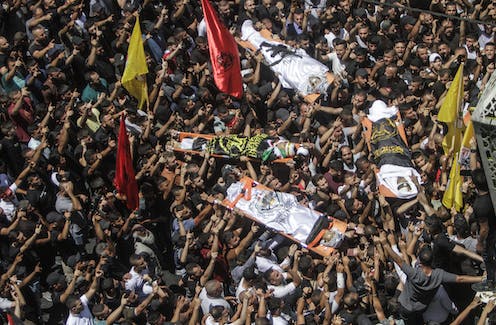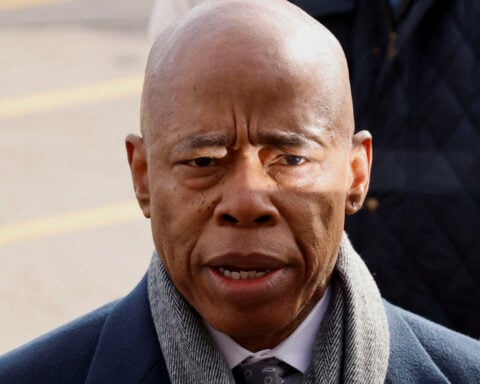
As Israeli soldiers withdrew from the Jenin refugee camp in the occupied West Bank after two days of fighting, Israel’s generals and politicians were quick to hail the major military operation there a success.
Herzl Halevi, chief of staff of the Israel Defense Forces, declared, “We hit the terrorists hard, we arrested many and destroyed many of their weapons and ammunition.” Israeli Prime Minister Benjamin Netanyahu praised the military for destroying “many terrorist infrastructures.”
But however successful in the short term, no military operation can resolve what I see as the underlying problem that caused Jenin’s refugee camp to become what Netanyahu has described as a “safe haven” for Palestinian militants.
That problem is a legitimacy crisis facing the Palestinian Authority – the self-governing body that has limited rule over parts of the occupied West Bank, including Jenin, that are not directly ruled by Israel.
As a scholar who specializes on the Israeli-Palestinian conflict and has written a book about it, I believe that this latest military operation will, in fact, only worsen that legitimacy crisis. Indeed, when three senior Palestinian Authority officials attended a mass funeral in Jenin on July 5, 2023, for some of the Palestinians killed in the fighting – at least 12 Palestinians were killed, most confirmed as militants – they were accused by mourners of weakness and quickly forced to leave by an angry crowd chanting, “Get out! Get out!”
Failure to provide security
The Israeli military’s incursion into Jenin’s densely populated refugee camp is just the most recent operation it has conducted in the northern West Bank city over the past two years. To be sure, the assault of June 3-4 was on a much greater scale than previous raids into Jenin. It was the largest that Israel has conducted in the West Bank since Operation Defensive Shield in 2002 during the Palestinian uprising of 2000-05, known as the second intifada. It was also the first time that Israel has used air strikes since then.
But the reason for this incursion was fundamentally the same as the reason why Israel has staged previous raids into Jenin – as well as into Nablus, another city in the northern West Bank – in recent years. That is, these cities have effectively become sanctuaries for armed Palestinian militants from which they regularly carry out shooting attacks against both Israeli soldiers and civilians.
Under the Oslo Accords signed by Israel and the Palestine Liberation Organization in the early 1990s, the Palestinian Authority is responsible for policing these cities and preventing militants from operating within them.
Yet the growing number of shooting attacks against Israelis that have been conducted by militants based in these areas suggests that it has failed in this task. Israeli officials have said that more than 50 shooting attacks have been carried out by Jenin-area militants since the beginning of 2023.
Israeli officials and American politicians have blamed the Palestinian Authority and its octogenarian leader, Mahmoud Abbas, for this failure. This criticism, however, overlooks why the Palestinian Authority has lost control over parts of the northern West Bank.
Unpopular and increasingly autocratic
The Palestinian Authority has become deeply unpopular with the Palestinian public. In a poll conducted last month by the Palestinian Center for Policy and Survey Research, 63% of Palestinians in the West Bank and Gaza thought the Palestinian Authority is a burden on them, while 50% thought its collapse or dissolution would be in the best interests of the Palestinian public. Abbas himself has even less support – 80% of Palestinians in that survey expressed dissatisfaction with him and wanted him to resign.
The Palestinian Authority’s unpopularity is due to numerous factors. Palestinians have accused it of corruption, incompetence and brutally repressing dissent. Human rights groups have accused the Palestinian Authority of arbitrarily arresting people and even torturing detainees.
The Palestinian Authority has undoubtedly become increasingly autocratic and authoritarian. There has not been a presidential election since 2005, and the last legislative elections were held in 2006. The continued schism between Abbas’s Fatah party and Hamas – a bitter rival that governs the Palestinian enclave of Gaza – has prevented its parliament, the Palestinian Legislative Council, from functioning. As a result, Abbas rules by decree.

The PA’s democratic decline is a product of a deeper, more fundamental problem: It has lost its legitimacy among an increasing number of Palestinians.
The reason for this, I believe, is that the Palestinian Authority has lost its raison d'etre. It was created in 1994 with the intention that it would be the embryo of a future Palestinian state. According to the Oslo Accords, it was meant to exist only temporarily – for no more than five years – during which time a peace agreement between Israel and the PLO would be negotiated, resulting in Palestinian statehood.
Fading hopes of statehood
Nearly three decades later, the Palestinian Authority still exists, but Palestinian statehood looks like a distant prospect at best.
Meanwhile, the land on which Palestinians expected this state would be built has been steadily eaten away by relentless Israeli settlement building. Indeed, most Palestinians have given up their hope for a Palestinian state.
The peace process appears to be dead – the Biden administration hasn’t even tried to resuscitate it – and Israel’s occupation of the West Bank, which began 56 years ago, seems permanent.
In such a bleak situation, the Palestinian Authority has become merely a municipal government – operating in the 40% of the West Bank that Israel prefers to avoid ruling over directly.
In addition to providing public services such as education and health care to Palestinians, its main function is to assist the Israeli army and security services to prevent Palestinian violence against Israelis. Yet, it is unable to prevent Israeli violence against Palestinians, which happens on a regular, and sometimes daily, basis, especially by extremist Jewish settlers.
It is little wonder, therefore, that many Palestinians regard the Palestinian Authority as a collaborator with Israel, a facilitator of Israel’s occupation, rather than a means to end it.
The Palestinian Authority’s security cooperation with Israel is most unpopular, which is why its officials and particularly the members of its security forces have become reluctant to perform this mission.
As a result, the Palestinian Authority has gradually lost control over places like Jenin and Nablus, leaving a power vacuum that has been filled by militant groups.
Some of these groups, specifically Hamas and Islamic Jihad, have ties with Iran, which encourages them to attack Israelis in order to destabilize the West Bank.
Others are newly formed, unaffiliated groups composed of armed young men and teenagers, whose violence is driven by despair, desperation and a desire for revenge.
These are the militants in Jenin whom the IDF has tried to capture or kill during its most recent military operation there.
No doubt, as Israeli authorities have said, the raid has succeeded in arresting some and killing others.
But this success comes at a steep price – first and foremost, to Palestinian civilians, but also to the Palestinian Authority. Unable to prevent this Israeli incursion or protect Palestinians, the Palestinian Authority’s impotence is apparent for all to see. This will, I believe, only worsen its standing in the eyes of the Palestinian public and exacerbate its legitimacy crisis.
Dov Waxman does not work for, consult, own shares in or receive funding from any company or organization that would benefit from this article, and has disclosed no relevant affiliations beyond their academic appointment.

 North Carolina justices block certification of election outcome in race for one of its own seats
North Carolina justices block certification of election outcome in race for one of its own seats
 Ex-Marine acquitted in NYC subway chokehold case seeks dismissal of suit brought by victim's father
Ex-Marine acquitted in NYC subway chokehold case seeks dismissal of suit brought by victim's father
 Probe of New York Mayor Eric Adams uncovers more criminal conduct, prosecutors say
Probe of New York Mayor Eric Adams uncovers more criminal conduct, prosecutors say
 Spiking yields puncture risk appetite, Japan warns on yen
Spiking yields puncture risk appetite, Japan warns on yen
 Argentina economy seen growing 4.5% in 2025, inflation cooling to double-digits
Argentina economy seen growing 4.5% in 2025, inflation cooling to double-digits
 Brazil's Embraer delivered 75 planes in fourth quarter
Brazil's Embraer delivered 75 planes in fourth quarter
 Exxon Mobil signals Q4 earnings to drop versus prior quarter
Exxon Mobil signals Q4 earnings to drop versus prior quarter
 Las Vegas Raiders fire first-year head coach Antonio Pierce
Las Vegas Raiders fire first-year head coach Antonio Pierce
 Grayson Murray's passion remembered during solemn tribute at the tournament he won
Grayson Murray's passion remembered during solemn tribute at the tournament he won
 Raiders fire coach Antonio Pierce after he goes 4-13 in lone full season
Raiders fire coach Antonio Pierce after he goes 4-13 in lone full season







